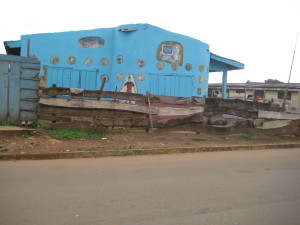Oriṣiriṣi ènìyàn miran tiki sọmọ Yorùbá pọ ni ìlú nla bi ti Èkó tàbí àwọn olú ìlù nla miran ni agbègbè ilẹ Yorùbá (fun àpẹrẹ: Abéòkúta, Adó-Èkìtì, Akurẹ, Ibadan, Oṣogbo, àti bẹ́ẹ̀bẹ́ẹ̀ lọ). Gẹ́gẹ́bí Wikipedia ti kọ, ni orílẹ̀ èdè Nàíjírià, èdè oriṣiriṣi lé ni ẹ̃dẹgbẹta lélógún, meji ninu èdè wọ̀nyí ko si ẹni to nsọ wọn mọ, mẹsan ti parẹ́ pátápáta. Eleyi yẹ ko kọwa lọgbọn lati dura ki èdè Yorùbá maṣe parẹ.
A ṣe àkíyèsí wipé ọ̀pọ̀lọpọ̀ ilé-ìwé alakọbẹrẹ ti àwọn ènìà nda silẹ ti ki ṣe ti Ìjọba, kò gba àwọn ọmọ láyè lati kọ tàbi sọ èdè Yorùbá ni ilé ìwè. Eleyi lo jẹ ikan ninu ìdí pípa èdè Yorùbá tàbi èdè abínibí yoku rẹ. Bí àwọn ọmọ ba délé lati ilé ìwè, èdè gẹẹsi ni wọn mba òbí sọ nítorí ìbẹrù Olùkọ wọn to ni ki wọn ma sọ èdè abínibí. Bi òbí ba mba wọn sọ èdè Yorùbá (tàbí èdè abínibí) àwọn ọmọ yio ma dahun lédè gẹẹsi. Ọ̀pọ̀lọpọ̀ Olùkọ́ ti o ni ki àwọn ọmọ ma sọ èdè Yorùbá wọnyi, èdè gẹ̀ẹ́sì ko ja gẽre lẹnu wọn, nítorí èyí àmúlùmálà ti wọn fi kọ́mọ, ni àwọn ọmọ wọnyi nsọ. Kíkọ, kíkà èdè Yorùbá ko di ọmọ lọ́wọ́ lati ka ìwé dé ipò gíga.
Ọmọdé lo ma tètè gbọ èdè ti wọn si le yara kọ òbí. Ìjọ̀gbọ̀n ni èdè aiyede ma nda silẹ nitorina ẹ majẹ ki a di àwọn ọmọ lọ́wọ́ ṣùgbọ́n, ka ran wọn lọ́wọ́ fún ìlọsíwájú èdè Yorùbá. Ó sàn ki gbogbo ọmọ tó parí ìwé mẹfa le kọ, ki wọn le kà Yorùbá tàbi èdè abínibí ju pé ki wọn ma le kọ, ki wọn ma lèkà rárá. Bi ọ̀pọ̀lọpọ̀ oníṣé ọwọ́, oníṣòwò àti àgbẹ̀ bá lè kọ́ lati kọ àti lati ka èdè Yorùbá ni ilé-ìwé ẹ̀kọ́ àgbà tàbi lẹ́hìn ìwé-mẹ́fà, á wúlò fún ìlú. Fún àpẹrẹ, wọn a le kọ orúkọ ní Ilé Ìfowópamọ́, kọ ọjọ́ ìbí ọmọ wọn sílẹ̀, kọ nípa iṣẹ́ wọn sí ìwé àti bẹ̃bẹ̃ lọ. Ẹnití o le kọ, tó lè kà Yorùbá kúrò ní alãikàwé/alãimọ̀wé bí o tilẹ̀ jẹ́ pe ko le kọ tàbí ka gẹ̀ẹ́sì.
ENGLISH TRANSLATION
There are many people who are not of Yoruba parentage in major cities like Lagos and other big Cities in Yoruba geographical areas (for example: Abeokuta, Ado-Ekiti, Akurẹ, Ibadan, Oṣogbo etc). According to Wikipedia, there are more than 520 languages in Nigeria, 2 of these languages are no longer spoken by anyone, 9 is totally extinct. This should teach us a lesson to struggle to ensure Yoruba does not go into extinction.
It can be easily observed that some private Primary School pupils not Government established in Nigeria, do not permit their pupils to study or speak Yoruba in School. This is one of the factors that can obliterate Yoruba or other ethnic languages. When the children return home from school, they speak English with their parents for the fear of their Teachers instruction not to speak “Vernacular”. If the parents are speaking Yoruba (or in any other mother tongue) the children respond in English. It is unfortunate that many of the teachers instructing pupils not to speak their mother tongue, are not even proficient in the English language, hence they pass on an adulterated version of English. Reading and Writing Yoruba is not an obstacle to educational performance.
It is better for children to be able to read or write a language after Primary 6 (Primary Education) rather than not being able to read or write at all. Children are usually quicker to understand languages and can then teach their parents particularly parents from other ethnic group other than Yoruba. Lack of understanding of a language is a source of misunderstanding, as a result let us not discourage but encourage the children for the promotion of Yoruba language. It is more useful for the country if more artisan, traders and farmers can acquire the knowledge of reading and writing Yoruba through the Adult Literacy Class or after primary education than not being able to write or read any language at all, for example they will be able to sign their name in the Bank, document their children birth dates, write about business activities etc. Someone who can write and read Yoruba is not an illiterate even though the means of communication is not in English.
Originally posted 2014-12-30 22:40:42. Republished by Blog Post Promoter



